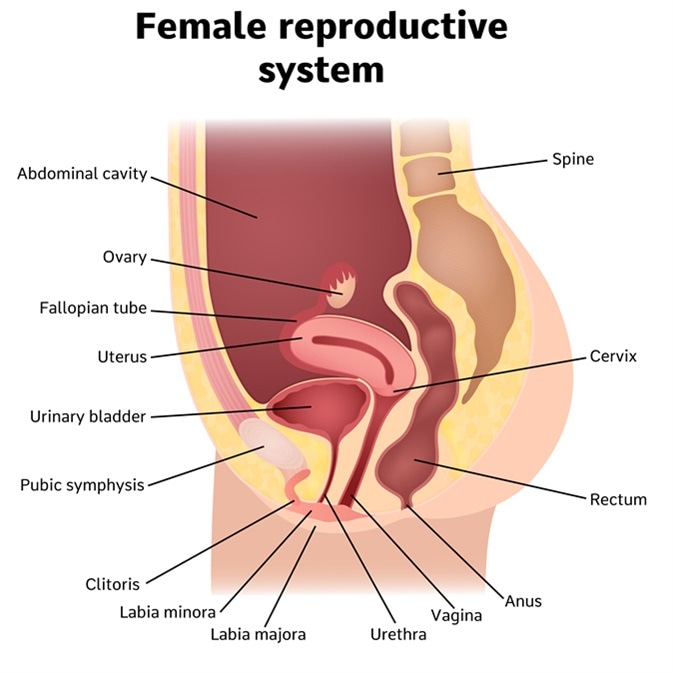A recent survey by a gynaecological cancer charity has shown that nearly half of the men could not identify a woman’s vagina correctly on a diagram.
The charity called The Eve Appeal asked around 2,000 British nationals including around a 1,000 men, to show where the vagina was in a diagram of the female reproductive system. About 50 percent of the men were clueless and could not do so. A further 61 percent could not identify a vulva. The survey results were published and released along with the start of Gynaecological Cancer Awareness Month in the U.K. in September.

Female internal genital organs sectional, structure of the female reproductive system. Image Credit: Shutterstock
The poll results point towards the fact that for many men still, a woman’s body is still none of their business and they consider it a mystery and a taboo not to be learnt or discussed about.
This calls for more awareness and a better understanding of gynaecological issues and diseases among the men feel experts. In the poll, around 17 percent of the men did not know anything about gynecological health issues and further did not think they needed to know anything at all since it is a “woman thing”. Further 24 percent of the surveyed men did not feel comfortable talking to their female partners about their gynaecological health problems and issues.
The Eve Appeal had conducted a similar survey last year. They had found that 44 percent of the women did not know where the vagina was on the diagram. This shows that women are not far behind in their ignorance about gynaecological health issues. One of the most important signs of all five types of gynaecological cancers is abnormal vaginal bleeding. The survey showed last year that around one in five women (19 percent) would not go to a doctor if they had abnormal vaginal bleeding. This is an alarming finding believe experts.
Athena Lamnisos, The Eve Appeal's chief executive said that the results of the surveys reveal the “shockingly low levels of awareness of the symptoms of gynaecological cancer among both men and women”. She emphasized that in most of these cancers, an early diagnosis is the key. She added that the charity received many calls from the male partners and believe that men can and do play a vital role in identifying the symptoms of gynaecological cancers in their women. Men can help by noticing a change in their partner’s vagina, detect unusual lumps, skin changes, bleeding or discharge from the vagina and also pain and discomfort during intercourse. When they do come across any of the warning signs of these cancers, they can help prompt their female partners to visit the doctor. In most of these cancers, the key is to be diagnosed and treated early. She added that this survey was not about better sex but about men helping their female partners is staying healthy and breaking the myths and taboos related to gynaecological health awareness making it a joint responsibility of both men and women.
Professor Janice Rymer, vice president of education at the Royal College of Obstetricians and Gynaecologists urged women not to be embarrassed to see a healthcare practitioner if they have any concerns or worries regarding their gynaecological health. Any unusual bleeding or different or foul smelling vaginal discharge or secretions from the vagina, alteration of the bowel habits or urinary pattern, pain or discomfort during sex should ring a bell. It may not be serious, she explained, but its best to get it checked.
Gynaecological cancers including those of the ovaries, uterus, cervix, vulval and vaginal are the fourth most common cancer among women in the UK and they kill nearly 7,700 women every year.
The Eve Appeal observes September as a gynaecological cancer awareness month.
Gynaecological Cancers - A brief explainer...
Reference